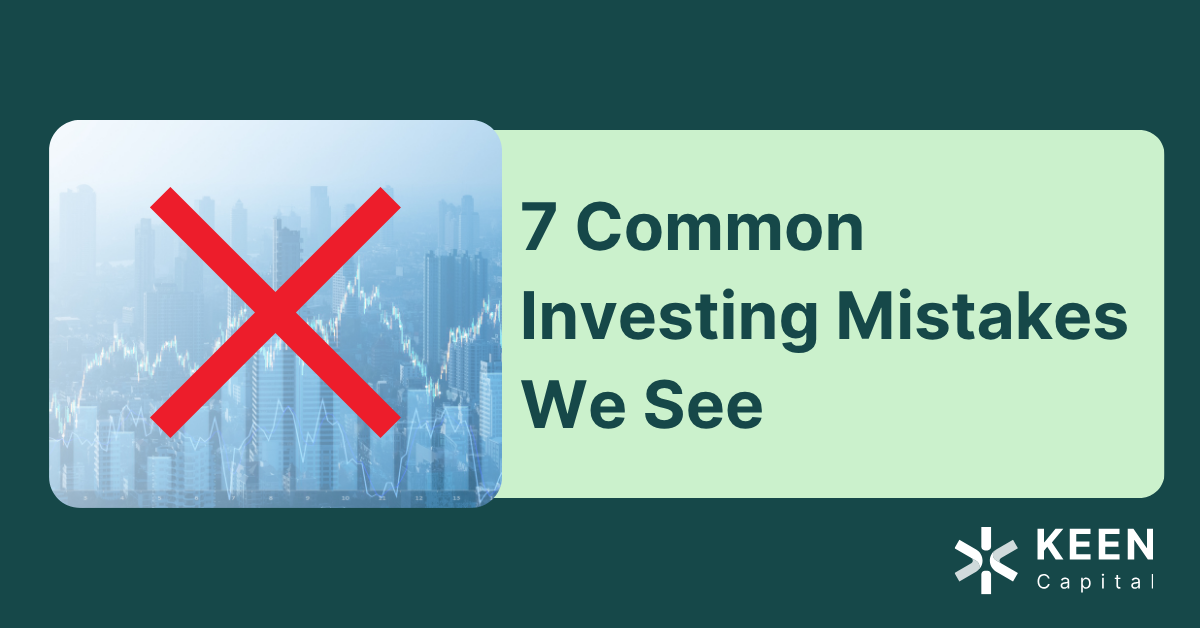At KEEN Capital, we work with professionals and entrepreneurs who’ve built impressive wealth through smart business moves.
But when it comes to managing personal investments, even the most financially savvy folks can make some very human missteps.
Why?
Because investing isn’t just a numbers game. It’s an emotional one. And when emotions enter the picture, even the sharpest thinkers can veer off course.
Here are the most common investment mistakes we see, plus how you can steer clear of them in 2025 and beyond.
1. Chasing Last Year’s Winners
It’s tempting to jump on whatever did well recently. You see a fund that returned 40 percent and assume it’ll keep going. But markets don’t work that way.
Performance is cyclical. Yesterday’s winners can quickly become today’s disappointments. What drives this mistake is our natural desire to find patterns and tell ourselves stories about momentum. That narrative can cause you to buy high, right before the drop.
Even Forbes flagged this issue, warning investors not to jump into strategies just because they’ve worked recently. Instead of chasing heat, look for investments where the fundamentals are strong, but the market hasn’t caught on yet. Diversify across different asset classes and resist the urge to pile into what’s currently popular.
2. Selling During a Market Correction
When the market drops 10 percent in a week, panic is understandable. But reacting emotionally can mean selling quality investments at the worst possible time.
This usually happens when your investment timeline doesn’t match your behavior. If you’re investing for a short-term goal, it makes sense to have guardrails like stop losses. But if your horizon is longer – like retirement or legacy planning – selling during a dip can seriously hurt your future.
Long-term investors are usually better off riding out the turbulence. Clarify your goals upfront. If you’re in it for the long haul, make peace with market ups and downs and avoid making moves out of fear.
3. Not Having a Safety Net in Retirement
When you’re still growing your wealth, market dips are uncomfortable but survivable. In retirement, they can do real damage.
If you’re relying on your portfolio for income and don’t have cash reserves, a downturn might force you to sell at a loss just to pay the bills. That’s a fast track to draining your savings too early.
We recommend keeping six to twelve months of expenses in cash once you hit retirement. You can also use a “bucket strategy” that separates your money into short-term cash, mid-term assets, and long-term growth investments. That way, you’re not pulling from stocks when they’re down.
4. Confusing Risk With Volatility
Volatility is normal. It’s the market’s way of breathing in and out. But many investors confuse it with actual risk.
True risk means a permanent loss of capital. Volatility just means prices are bouncing around. If you sell during that bounce, you’re turning paper losses into real ones and possibly missing the rebound.
A better approach is to understand your personal tolerance for risk and build a plan around it. Focus on long-term returns rather than short-term swings. Look at how your investments fit into your overall plan, not just their day-to-day performance.
5. Ignoring The Tax Picture
Smart investing isn’t just about growing your money. It’s about keeping more of it after taxes.
Too many people miss out on tax-saving opportunities. That might mean realizing short-term gains too early, skipping tax-loss harvesting, or holding the wrong investments in taxable accounts.
The fix? Think about taxes year-round, not just in April. Use retirement accounts wisely, consider where each asset lives (tax-wise), and work with advisors who understand both sides of the investment and tax equation.
6. Trying to Catch a Falling Knife
When a stock plummets, it’s easy to think, “It’s down 50 percent. It has to come back.” But that’s not always how it works.
Just because something was once worth more doesn’t mean it will be again. Buying on the way down – hoping to catch the bottom- is risky, even for pros. If the business fundamentals aren’t there, the price doesn’t matter.
Before buying into a major decline, take a hard look at the company. Are its earnings stable? Is it still competitive? Is the balance sheet healthy? If the story no longer holds up, it might be time to walk away.
7. Letting Emotions Drive Decisions in an Uncertain Year
Let’s face it. 2025 isn’t shaping up to be a calm, predictable year. Between elections, rate changes, and big shifts from AI, there’s a lot in motion.
This kind of environment makes it tempting to react. To make big changes based on headlines. But that rarely ends well.
The best thing you can do is build a clear investment philosophy and stick to it. Whether that’s passive indexing, factor-based strategies, or something else, let the plan be your anchor. A good advisor won’t just manage your portfolio. They’ll help you stay grounded when things get noisy.
Final Thoughts: It’s Not About Being Perfect. It’s About Being Intentional.
Even the most successful investors make mistakes. The difference between those who stay on track and those who don’t often comes down to mindset, discipline, and a willingness to step back and think long term.
At KEEN Capital, we’re not just here to grow your portfolio. We’re here to help protect it from the common (and often avoidable) pitfalls that can derail even the best-laid plans.
If you’re ready to invest more intentionally in 2025, let’s talk.



